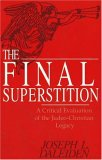The development of just and effective social policies on such important issues as population control, abortion, sexuality, euthanasia, capital punishment, and even income distribution requires sophisticated knowledge about human nature and the environment. Too often, however, such policies are determined by religious traditions or influenced by church leaders claiming to speak with divine authority. Can those who pretend to speak for Gd be trusted to determine appropriate moral behavior? Can the fixed tenets and the insular sacred texts of organized religion be relied on as sources for ethical, behavioral, and economoic policy making in today’s complex and evolving society?
Addressing these and related questions, this volume clears away myths and deliberate falsehoods to reach the bedrock of truth about Western society’s Judeo-Christian tradition. In The Final Superstition Joseph Daleiden examines the origins of Judaism, Catholicism, and the various Christian fundamentalist sects. He demonstrates that in every instance the proponents of new religions exploit the misery and ignorance of their followers to gain control over their lives, resulting in a ruthless despotism that vigorously stamps out all dissent.
Next, Daleiden traces the biblical stories of Jesus and Moses and the Genesis account of creation to their pagan beginnings, demonstrating them to be efforts by a pre-scientific people to explain the mysteries and origin of the world around them — explanations that have long since been superseded by the discoveries of science. Similarly, the moral injunctions of the Bible, as codifications of ancient traditions, are incompatible with an enlightened modern perspective, since they condone slavery, the subjugation of women, and even genocide.
Taking his investigation further, Daleiden offers an in-depth analysis of the arguments for the existence of God, and shows that there is no reasonable logic for them. He explores the psychological reasons why, all evidence to the contrary, people continue to cling to outmoded beliefs.
Sound ethics and effective social doctrines must not be grounded in myth and falsehood. Written in a lively dialogue form, The Final Superstition offers a devastating counterattack against those religionists who have for too long dictated public policy, often with dire consequences. While many who have looked to religion for comfort will find its conclusions unsettling, open-minded readers of this book will discover powerful arguments for emancipation from ancient superstition and erroneous moral systems.




